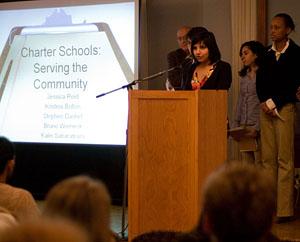February 9, 2010
This past month, economics major Sid Salvi ’12E collaborated with local nonprofit Arise for Social Justice, residents of East Springfield and two other college students to ascertain what impact a proposed biomass plant might have on the community.
The undergraduates looked at the differences between burning “clean wood” for energy and processing wood chips derived from construction and demolition debris. They educated themselves about renewable energy credits. And they read up on the economy of Western Massachusetts, among other things.
But perhaps most importantly, they heard the concerns of members of a diverse community who were worried that such a plant might pollute their air and make them sick.
 Students in the charter schools group present their final project for the CCE’s “Crafting Public Policy.” |
“You can learn a lot about an issue by just talking to people,” Salvi explained. “It’s so important to go out and hear how residents feel to be able to really explore the best way to meet their needs.”
“You may have what you think is a solution,” he continued, “but when you put it out into the world, how that solution may be implemented may affect a community in a much different way than how you intended it to.”
Salvi’s experiences working with the residents of East Springfield and Arise for Social Justice came courtesy of a new Center for Community Engagement (CCE) Interterm course that he conceived and helped create. Titled “Crafting Public Policy,” the non-credit class gave him and 17 other motivated undergraduates from Amherst, Mount Holyoke, Hampshire and Oberlin colleges and the University of Massachusetts a better idea of the local landscape in four specific areas: charter schools, homelessness, food security and biomass.
Through the course, students explored how public policy is created, first in the classroom, and then on a more practical level—by interacting with members of the community. In addition to reading about and discussing policy-making in class meetings, the undergraduates conducted needs assessments for five organizations—Arise for Social Justice, the Springfield Promise Neighborhood Committee, the Interfaith Housing Corp, Holyoke Food and the Fitness Policy Council—developed policy recommendations for the groups and then offered suggestions for implementation and sustained engagement.
They presented the fruits of their labor at a reception on Feb. 4 in Keefe Campus Center, showing multimedia presentations and speaking briefly about their final projects.
According to “Crafting Public Policy” instructor and Springfield Institute Director Aron Goldman, participants in the class didn’t necessarily come up with ideas for new policies that hadn’t been proposed previously. But they did give “a voice to the voiceless,” he said.
“Part of what the students did was use cheap and easily accessible technology to elevate the concerns of the regular and underrepresented people you don’t normally hear from in the policy context,” he explained, citing interviews the participants conducted with area residents and then uploaded to YouTube. “They said, ‘We don’t want to just talk to the experts at the think tanks in Boston, we want to talk to real residents in the community.’ And a lot of the people that they spoke with said, ‘No one has asked us how we feel about this. Thank you!’”
Using the information and videos the students created and made available online, said Goldman, those same residents will be able to mobilize fellow community members, reach out to media and possibly create funding proposals.
“I think many of us take for granted how many tools we have at our disposal to reach out and inform people,” Goldman added. “But people in disadvantaged communities—the homeless are a perfect example—don’t have the same kinds of resources to do something about these issues on a more systemic level. The students’ job was to listen to as many of these stakeholders as possible—with a special emphasis on underrepresented groups—and assemble their ideas, synthesize them and retransmit them in a way that raises the level of debate but also broadens participation in that debate.”
Of course, members of the community weren’t the only ones who benefited from the class. Several of the undergraduates were grateful that “Crafting Public Policy” enabled them to interact with people off campus and learn more about Western Massachusetts, their “home away from home.”
“I discovered so much about the Pioneer Valley through this class—I really hadn’t gone out into the community that much before this,” noted Salvi. “It was really interesting to hear more about the issues affecting this area.”
Still others were glad for a more practical reason: exposure to a possible future career. Charter schools group member Laura Zaccagnino ’12, for example, said that the course made her think more seriously about a career in education policy. “We’re not going to solve problems that people have been struggling with for years in a couple of weeks,” she admitted. “But it’s good for us all to learn more about these important issues and maybe down the road figure out a solution together.”